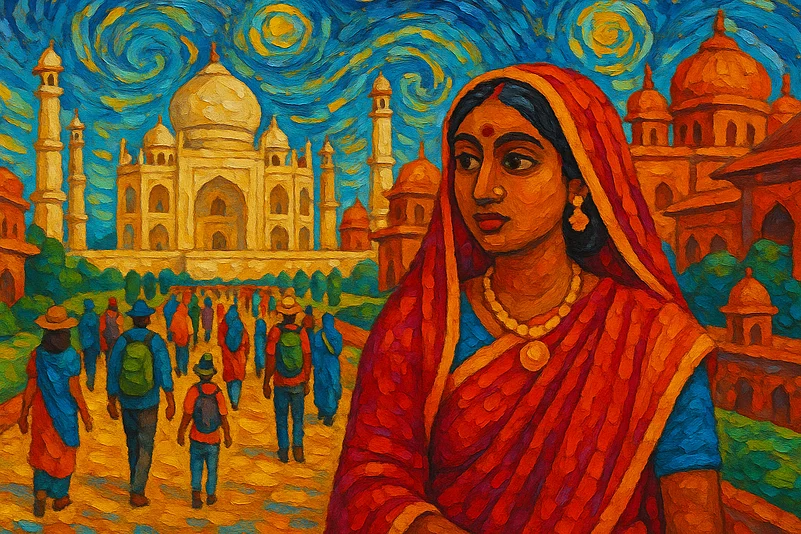
Summary of this article
82 per cent of Indians now plan trips around culture.
Festivals, heritage cities and hidden gems drive travel choices.
Safety, family travel and affordability shape cultural journeys.
For most Indians, travel is now moving from mere relaxation to significant cultural experiences. Skyscanner's Cultural Tourism Report 2025 states that 82 per cent of Indian travellers planned their journeys predominantly around culture this year. The trend is most apparent in young generations, with 84 per cent of millennials and 80 per cent of Gen Z travellers having a strong affinity towards cultural vacations.
This increasing interest does not stop at sightseeing. For most travellers, a journey is only a success if they are returning home having learned something new about the area or its inhabitants. Approximately 39 per cent of travellers indicated they would be interested in holidays involving knowledge and greater affinities over merely visiting attractions.
Festivals Take the Lead
Indian festivals are emerging as among the strongest magnets for domestic tourism. The Cultural Tourism Report 2025 discovered that over half of Indian travellers, 55 per cent, have visited local festivals, fairs or cultural events.
The most interest is generated by Durga Puja in Kolkata, with 53 per cent of tourists eager to see the festival. Lathmar Holi in Barsana comes next at 51 per cent, and Onam in Kerala draws 35 per cent interest. The festivals are no longer regarded as secondary events but as the prime reason to plan vacations.
The trend is also seen in travel search. For instance, searches for Varanasi, which is one of India's most traditional cultural cities, have gone up by 76 per cent for 2025 as compared to last year.
Apart from celebrations, most visitors are attracted to India's heritage sites. About 53 per cent are fascinated with visiting ancient cities like Jaipur and Varanasi, and 39 per cent are motivated to see UNESCO World Heritage Sites like the Taj Mahal in Agra and Hampi in Karnataka.
Kerala and Rajasthan are also emerging as cultural hubs. As per the report, Kerala attracts 32 per cent of tourists for its backwaters and traditional art, while Rajasthan draws 30 per cent for its palaces and forts. These states are becoming more and more regarded as cultural capitals where heritage, architecture and traditions come together.
Hidden Gems in Demand
The Cultural Tourism Report 2025 also underscores how 93 per cent of tourists are willing to travel to lesser-known places if they provide genuine cultural experiences. This increasing interest in the unknown is an expression of a need to get away from congested trails and experience local traditions that are untouched.
Most travellers also aspire to progress from viewing culture to engaging with it. Almost 39 per cent showed interest in visiting heritage villages or ecocultural communities. Another 38 per cent would love to trace culinary trails to learn about the historic origin of local foods.
Practical Decisions Define Trips
Although culture is a good driver, travellers also think about practical considerations before they make arrangements. The report identifies that safety tops the list, with 45 per cent of travellers naming it as their first priority for cultural travel. Authenticity matters to 33 per cent, while 31 per cent look to seasonality in decision-making.
Planning tends to begin early. Approximately 41 per cent of tourists start preparing one to two months earlier. When seeking inspiration, 45 per cent use social media, 39 per cent consult friends and relatives, and 27 per cent use travel apps.
Value for money is also a major factor. 60 per cent of those surveyed indicated that awareness about the right time to book festival flights is their most useful travel tip. Another 58 per cent rely on price comparison prior to making arrangements.
Family and Group Travel
Cultural tourism is not merely destinations but also about being with people. This report also emphasised that 71 per cent of Indians prefer to be with family while travelling, while 62 per cent prefer being with friends. Being with a partner or spouse is favored by 56 per cent. This reflects how cultural tours which usually are group activities, are strengthening relationships through experiences and memories.
A Change in Interest
This wave of culture heralds a larger change in Indian tourism. Travellers no longer want the passive experience of sightseeing. They prefer to get involved in local traditions, festivals, and heritage in more experiential ways.
The report states that the trend is helped by improved infrastructure, improved connectivity and increased digital accessibility. Government programs like Dekho Apna Desh, Swadesh Darshan 2.0 and Adopt A Heritage are also contributing.
From the tribal festivals of the Northeast to Ayurvedic Kerala, various parts of the country are now seeing new opportunities in tourism. Cultural discovery is becoming a means of conserving heritage, enabling local communities and showcasing India's diversity as a national strength.
Culture over leisure
The Cultural Tourism Report 2025 shows that Indians are opting for culture over leisure. With 8 out of every 10 travellers now holidaying around festivals, heritage cities and off-the-beaten-track traditions, cultural tourism is no longer niche. It is becoming the heart of travel decisions and defining the destiny of tourism in India.











